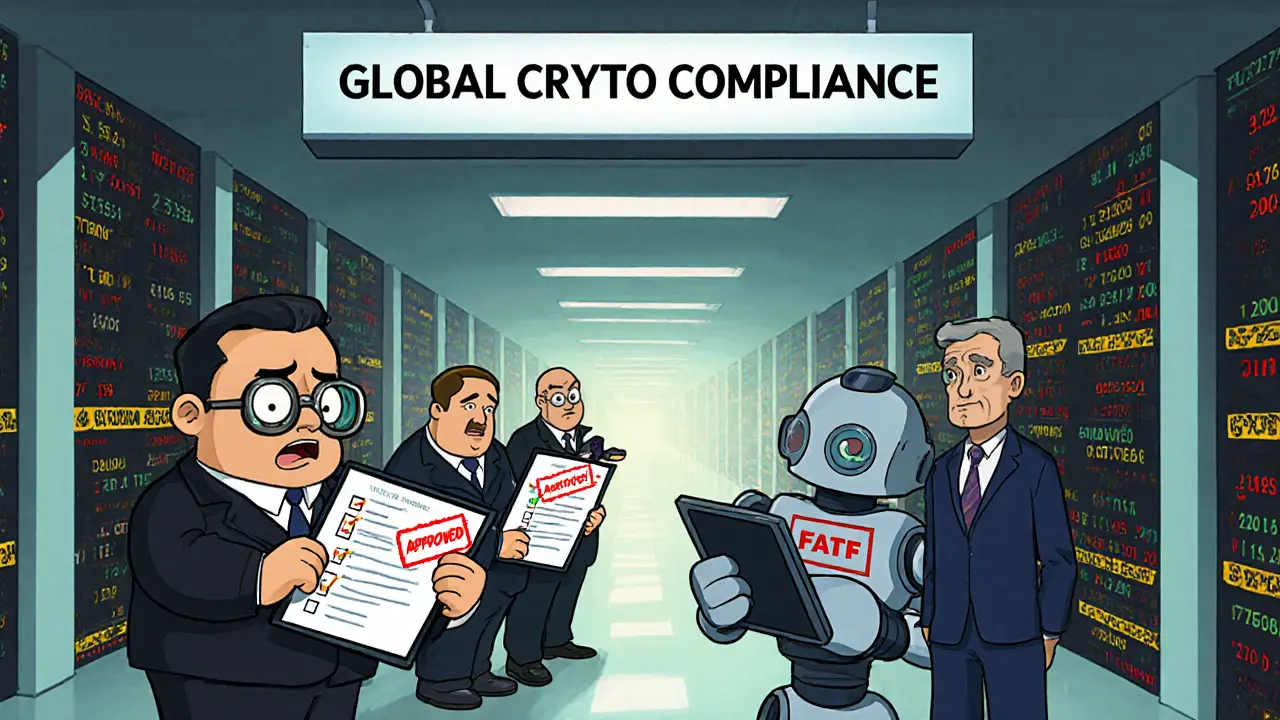FATF Blacklist 2025: How Iran, North Korea, and Myanmar Are Shaping Crypto Bans
 Jan, 25 2025
Jan, 25 2025
FATF Blacklist 2025: Crypto Compliance Checker
Iran
Full counter-measures since 2020. All VASPs must conduct enhanced due-diligence; most exchanges block Iranian IPs and wallet addresses.
High RiskNorth Korea
Full counter-measures with aggressive enforcement. Any crypto address linked to hacking groups is automatically frozen.
Highest RiskMyanmar
Enhanced due-diligence (no full counter-measures). VASPs must verify ultimate beneficial owners; some crypto activity still allowed.
Medium RiskExchanges must:
- Refuse onboarding customers from these countries
- Freeze or report transactions involving sanctioned addresses
- Run extra monitoring on cross-border crypto payments
Non-compliance risks:
- Hefty fines
- Loss of banking relationships
- Criminal prosecution for compliance officers
Total illicit crypto flows from blacklisted countries: $15.8 billion
Percentage of all illicit crypto activity: ~40%
Notable incidents:
- Iran: $2.3 billion Bitcoin outflows in 2024
- North Korea: $1.5 billion ByBit hack (Feb 2025)
- Myanmar: $150 million funneled by military-linked broker
US Agencies (2024):
- OFAC: 13 designations targeting crypto addresses
- FinCEN: Proposed rule to regulate Huione mixer
International Efforts:
- Netherlands Central Bank updates capital buffers
- FATF maintains current blacklist status
Best practices for staying compliant:
- Implement real-time sanctions screening
- Conduct enhanced due-diligence for high-risk jurisdictions
- Train staff regularly on sanctions updates
- Partner with analytics providers for transaction monitoring
- Audit your program annually against FATF Recommendations
Since June132025 the FATF blacklist has listed Iran, North Korea, and Myanmar as the three highest‑risk jurisdictions for money‑laundering, terrorism financing, and weapons‑proliferation threats. For anyone watching crypto markets, that list matters because it drives the toughest anti‑money‑laundering (AML) rules, forces exchanges to block users from those countries, and fuels a wave of enforcement actions aimed at the digital‑asset ecosystem.
Why the FATF Blacklist Matters for Crypto
Crypto assets are borderless, pseudonymous, and can be moved with a single click. Those features make them attractive for ordinary people seeking financial freedom, but they also give sanctioned actors a way to dodge traditional banking controls. The FATF is the inter‑governmental body that sets global AML/CFT standards therefore treats jurisdictions on its blacklist as "high‑risk" and tells every member country to apply extra safeguards, ranging from full counter‑measures to enhanced due‑diligence.
In practice, that means crypto exchanges must:
- Refuse onboarding customers who are national or residents of Iran, North Korea, or Myanmar.
- Freeze or report any transaction involving crypto addresses linked to sanctioned entities.
- Run extra monitoring on cross‑border crypto payments that could be hiding illicit proceeds.
Failure to comply can result in hefty fines, loss of banking relationships, or even criminal prosecution for senior compliance officers.
Country Snapshots: Crypto Enforcement in Iran, North Korea, and Myanmar
| Country | Primary FATF Action | Typical Crypto Restrictions | Notable Recent Incident |
|---|---|---|---|
| Iran | Full counter‑measures since2020 | All VASPs must conduct enhanced due‑diligence; most exchanges block Iranian IPs and wallet addresses. | Rapid surge in Bitcoin outflows in 2024, estimated $2.3billion moved abroad. |
| North Korea | Full counter‑measures, aggressive sanctions enforcement | Any crypto address linked to the regime’s hacking groups is automatically frozen by major platforms. | ByBit hack - $1.5billion stolen in February2025, attributed to Lazarus Group. |
| Myanmar | Enhanced due‑diligence (no full counter‑measures) | VASPs must verify ultimate beneficial owners; many still allow limited crypto activity. | Military‑linked broker funnelled $150million in crypto to overseas wallets in 2024. |

How Criminal Actors Exploit Crypto in Blacklisted Jurisdictions
The data from Chainalysis a blockchain analytics firm tracking illicit flows shows that sanctioned jurisdictions moved $15.8billion in crypto during 2024 - nearly 40% of all illicit crypto activity worldwide. Two patterns dominate:
- State‑sponsored hacking. North Korea’s Lazarus Group runs sophisticated ransomware‑as‑a‑service operations, stealing billions from exchanges, gaming platforms, and DeFi protocols.
- Capital flight. Iranian citizens, cut off from the global banking system, turn to Bitcoin and stablecoins to preserve wealth and send money abroad.
Both trends rely on anonymity‑enhancing tools - mixers, privacy‑coins, and offshore wallets - that make it harder for law‑enforcement to trace the final beneficiary.
Global Enforcement Response: From OFAC to FinCEN
The United States has taken the lead in extending sanctions into the crypto realm. In 2024 the Office of Foreign Assets Control (OFAC) issued 13 designations that included specific crypto addresses - the second‑highest total in the past seven years. Those designations target the Islamic Revolutionary Guard Corps (IRGC), North Korean hacking groups, and Myanmar military‑linked entities.
FinCEN, the U.S. financial‑intelligence unit, has complemented OFAC’s actions with a proposed rule that would place the Huione Group (a known mixer) on the primary money‑laundering concerns list. The rule also calls for tighter reporting thresholds for large crypto‑transactions involving high‑risk jurisdictions.
Internationally, the Netherlands Central Bank continues to update its counter‑cyclical capital buffer requirements for banks with exposure to the three blacklist countries, while the FATF itself keeps the list static, signalling that compliance gaps remain stark.
Compliance Challenges for Crypto Businesses
Even though the FATF’s guidance is clear, implementing it is messy. As of April2024, three‑quarters of FATF member states were either non‑compliant or only partially compliant with virtual‑asset regulations. This patchwork creates loopholes that criminals exploit:
- Many jurisdictions lack a legal definition of “virtual asset service provider” (VASP), leaving exchanges unsure about registration requirements.
- Cross‑border data‑sharing agreements are still being negotiated, so a suspicious wallet flagged in Europe may not surface in the U.S. until weeks later.
- Small‑to‑medium exchanges often cannot afford the sophisticated screening tools used by large platforms, making them vulnerable to accidental onboarding of sanctioned users.
For compliance officers, the practical rule of thumb is to treat any transaction involving an address that appears on a sanctions list - even a single token transfer - as high‑risk and to trigger a full investigation.

What the Future Holds for Crypto Regulation Around the Blacklist
Looking ahead, the FATF is likely to tighten its virtual‑asset standards. Its June132025 update added the British Virgin Islands and Bolivia to the “under increased monitoring” tier, showing a willingness to broaden scrutiny. However, the core trio - Iran, North Korea, Myanmar - stayed on the blacklist, meaning no relaxation in counter‑measures is expected.
Two developments could shift the landscape:
- Technical solutions. Enhanced on‑chain analytics and AI‑driven risk scoring may give regulators the visibility they need to enforce sanctions without choking legitimate users.
- Geopolitical negotiations. If diplomatic breakthroughs lead to partial sanctions relief for Iran or Myanmar, the FATF could downgrade their status, which would cascade into lighter crypto restrictions.
Until either scenario materializes, crypto firms should assume a high‑risk environment and embed robust screening, transaction monitoring, and staff training into their daily operations.
Key Takeaways
- The FATF blacklist remains fixed on Iran, North Korea, and Myanmar as of October2025.
- Crypto assets are a primary channel for these regimes to evade sanctions, with $15.8billion flowing through illicit wallets in 2024.
- U.S. agencies (OFAC, FinCEN) are extending traditional sanctions into the crypto space, targeting addresses, mixers, and VASPs.
- Global compliance is uneven; most countries still lag on virtual‑asset AML rules, creating exploitable gaps.
- Firms that invest in advanced analytics, staff training, and proactive monitoring will survive the tightening regulatory tide.
Frequently Asked Questions
What does it mean when a country is on the FATF blacklist?
Being on the blacklist signals that the country poses a high risk for money‑laundering, terrorism financing, or weapons proliferation. FATF member states must apply specific counter‑measures-often full sanctions-when dealing with financial institutions or crypto services linked to that jurisdiction.
How are crypto exchanges forced to block users from Iran, North Korea, and Myanmar?
Most exchanges implement geolocation checks, IP‑blocking, and wallet‑address screening against sanctions lists published by OFAC and the EU. They also require robust KYC documentation that reveals the user’s nationality and residency. If any indicator ties a user to a blacklisted country, the account is frozen or denied.
Why is North Korea considered the biggest crypto threat?
North Korea runs state‑sponsored hacking groups like Lazarus that specialize in ransomware, phishing, and exchange theft. Their operations have generated billions in crypto, most famously the $1.5billion ByBit hack in 2025. The regime uses the proceeds to fund its nuclear program, making it a top priority for sanctions agencies.
What role does Chainalysis play in tracking sanctioned crypto flows?
Chainalysis provides blockchain‑analytics tools that label wallets, trace transaction paths, and estimate the value of illicit flows. Their 2024 report showed that sanctioned jurisdictions accounted for $15.8billion of illicit crypto, a metric regulators use to prioritize enforcement actions.
How can crypto businesses stay compliant with the evolving FATF standards?
Implement a risk‑based AML program that includes: (1) real‑time sanctions screening of wallets and addresses, (2) enhanced due‑diligence for high‑risk jurisdictions, (3) regular staff training on sanctions updates, and (4) partnership with analytics providers for on‑chain transaction monitoring. Auditing the program annually against the latest FATF Recommendations is also essential.
Dick Lane
October 11, 2025 AT 02:02Real talk: if your bank won't let you send money home, what else are you supposed to do?
Norman Woo
October 11, 2025 AT 07:43Serena Dean
October 11, 2025 AT 23:57Small exchanges are drowning though - they need more support, not just fines.
James Young
October 12, 2025 AT 12:21North Korea stole $1.5B from ByBit. That's not activism. That's war. And you're acting like it's a protest.
Chloe Jobson
October 13, 2025 AT 08:19Need cross-border data-sharing protocols, stat.
Andrew Morgan
October 13, 2025 AT 16:07This whole system feels like punishing the sick because the doctor is corrupt. I’m not saying the regime’s clean but the people? They’re just trying to survive.
madhu belavadi
October 14, 2025 AT 14:05Michael Folorunsho
October 15, 2025 AT 06:14Stop romanticizing sanctions evasion. It’s not rebellion, it’s recklessness.
Roxanne Maxwell
October 16, 2025 AT 02:25Maybe the rules need to be stricter for the regime, not the people.
Jonathan Tanguay
October 16, 2025 AT 22:09And don’t even get me started on how mixers like Huione are still operating under shell companies in the Caribbean with zero KYC - that’s not a loophole, that’s a national security threat.
Also, the Chainalysis report is flawed because it doesn’t account for the fact that 40% of Iranian stablecoin transactions are actually legitimate remittances disguised as crypto transfers because the central bank has blocked SWIFT.
And don’t even mention Myanmar’s military-linked brokers - they’re using Telegram bots to auto-route crypto through Binance P2P, which means the real enforcement failure is in the lack of API-level monitoring by regulators.
And nobody’s talking about how the Dutch Central Bank’s capital buffer requirements are actually incentivizing banks to exit crypto entirely, which pushes users toward even less regulated platforms - so you’re creating a feedback loop of risk.
And the fact that Bolivia got added to increased monitoring but not the blacklist? That’s pure geopolitical bias. They’re not even a top 50 crypto user country.
Bottom line: regulation without tech infrastructure is just theater. And until we fix the root cause - fragmented global standards - we’re just rearranging deck chairs on the Titanic.
Ayanda Ndoni
October 17, 2025 AT 05:10